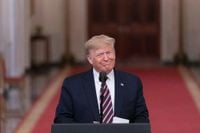In a surprising turn of events, U.S. President Donald Trump has stirred the Hollywood pot by proposing a 100% tariff on non-American films, a move that has left the entertainment industry in a state of confusion and concern. However, amid this controversial plan, he has assured fans of the iconic James Bond franchise that they have "nothing to worry about." This statement, made during a recent press conference, has sparked both intrigue and skepticism among industry insiders and the public alike.
On May 9, 2025, Trump announced his intentions to impose tariffs on films made abroad, citing a desire to bring production back to the United States. "As you know, we’re going to be doing some tariffs to get [movie production back]," he stated. "A lot of them have left this country. They all live here, the money comes from here, everything comes from here, but they make them in other countries. So, we’re gonna do something to bring them back, maybe to a large extent." This declaration was part of a broader strategy to revitalize the American film industry, which Trump claims has been adversely affected by foreign competition.
Despite the sweeping nature of his proposal, Trump made a special exception for the James Bond films, which are produced in the UK. He quipped, "But James Bond has nothing to worry about, that I can tell you," emphasizing his friendship with the late Sean Connery, who famously portrayed the British spy. Trump reminisced about how Connery helped him navigate zoning issues for his golf courses in Aberdeen, saying, "Sean Connery was responsible for my getting zoning in Aberdeen. He said, ‘Let the bloody bloke build his golf courses.’" Trump's comments reflect not just a personal connection to the actor but also a recognition of the cultural significance of the Bond franchise.
The announcement has not been without its critics. Online reactions have varied from bemusement to outright disbelief, with some questioning whether Trump understands that James Bond is a fictional character. One user sarcastically remarked, "Imagine putting tariffs on Britain's most famous super-spy," while another quipped, "He probably thinks James Bond is American." Such responses highlight the disconnect between Trump's rhetoric and the realities of the film industry.
In the wake of Trump's announcement, the White House clarified that no final decisions have been made regarding the tariffs. An official stated, "The administration is exploring all options for implementing President Trump's directive to protect our country's national and economic security while making Hollywood great again." This statement suggests that while Trump is pushing for tariffs, the actual implementation may be more complex and subject to negotiation.
Industry insiders have expressed concern over the potential impact of such tariffs on film production. Jon Voight, a prominent actor and one of Trump's appointed ambassadors for the American film industry, along with his producing partner Stephen Paul, presented a comprehensive plan to the president aimed at saving the entertainment sector. This plan includes federal incentives for production, co-production agreements with foreign countries, and infrastructure subsidies for theater owners.
Voight and Paul’s initiative reflects a growing recognition within Hollywood that collaboration, rather than confrontation, may be the key to revitalizing the industry. As production increasingly shifts overseas, the need for a more supportive domestic environment has become apparent. Trump’s tariffs could have the unintended consequence of driving more filmmakers to seek opportunities abroad, further exacerbating the very problem he aims to solve.
Moreover, the timing of Trump's proposal coincides with several major Hollywood projects currently filming outside the U.S., including high-profile titles like "Avengers: Doomsday" in London and "The Odyssey" in Italy and Morocco. The ongoing production of these films underscores the global nature of the film industry and the challenges that come with imposing tariffs on an interconnected market.
Trump's administration has also faced pushback from within Hollywood, with notable figures like actress Whoopi Goldberg voicing their concerns. Goldberg urged Trump to reconsider his approach, stating, "Who do you want to set the tariff for? Production? Studio? What do you mean? This is part of what we made. Please stop." Her comments reflect a broader sentiment among industry professionals who fear that such tariffs could stifle creativity and innovation.
As the debate over Trump's proposed tariffs continues, it remains unclear how this policy will unfold. While the president's assurances regarding the James Bond franchise may provide some comfort to fans, the broader implications for the film industry are still uncertain. The potential for a trade war with the UK, particularly in light of the recent trade deal signed between the two nations, adds another layer of complexity to the situation.
In the meantime, industry executives are bracing for discussions with the Trump administration to share their insights and concerns regarding the proposed tariffs. Trump has expressed a desire to ensure that the film industry is happy with any new policies, stating, "I want to make sure they’re happy with it because we’re all about jobs." This statement indicates a recognition of the importance of the entertainment sector to the American economy.
As Hollywood navigates this tumultuous landscape, the fate of the film industry hangs in the balance. Will Trump's tariffs serve to bolster American production, or will they drive filmmakers further afield? Only time will tell, but one thing is certain: the conversation surrounding the future of the film industry is far from over.




